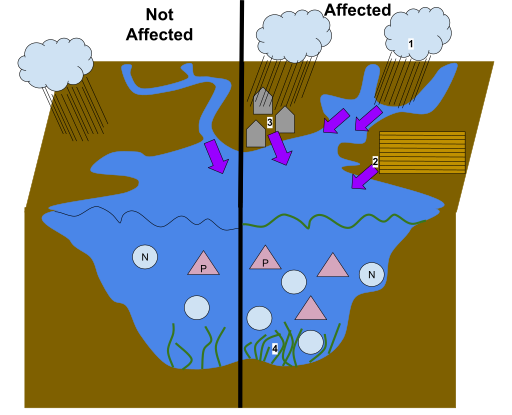
Which of the following is a non-point source of water pollution?
A. Road runoffs
B.Oil Wells
C. Thermal power plants
D. Underground coal mines.
Answer
593.1k+ views
Hint: Unlike point source of pollution, which comes from a single place, Non-point sources of pollution are difficult to identify and it is the pollution that comes from many places. It generally includes land runoffs, precipitation, atmospheric deposition, drainage, and so on.
Complete answer: Unlike pollution from industrial, sewage treatment plants, non-point source (NPS) of pollution results from many different sources.
It is hard to recognize and treat, and hence becomes a leading cause of water quality issues. These pollutants have harmful effects on drinking water supplies, fisheries, and wildlife. Rainfall or snowmelt moving over and through the ground generally causes NPS or non-point sources of pollution.
These runoffs carry away with the natural and man-made pollutants and eventually deposit them in natural water resources such as lakes, rivers, wetlands, coastal waters, and ground waters and pollute them.

Therefore, the correct answer is Road runoff
Note: Few other non-point pollution include:
Excess fertilizers, herbicides, and insecticides.
Toxic chemicals from urban runoffs.
Sediments from various construction sites, crop and forest land.
microbes from livestock.
Atmospheric deposition and hydromodification etc.
An oil well is like a boring Earth that is designed to bring petroleum oil up to the surface.
A thermal power plant is used to convert heat energy into electrical energy.
Underground coal mines are used to extract coal from the ground which can be used as a source of energy.
Complete answer: Unlike pollution from industrial, sewage treatment plants, non-point source (NPS) of pollution results from many different sources.
It is hard to recognize and treat, and hence becomes a leading cause of water quality issues. These pollutants have harmful effects on drinking water supplies, fisheries, and wildlife. Rainfall or snowmelt moving over and through the ground generally causes NPS or non-point sources of pollution.
These runoffs carry away with the natural and man-made pollutants and eventually deposit them in natural water resources such as lakes, rivers, wetlands, coastal waters, and ground waters and pollute them.

Therefore, the correct answer is Road runoff
Note: Few other non-point pollution include:
Excess fertilizers, herbicides, and insecticides.
Toxic chemicals from urban runoffs.
Sediments from various construction sites, crop and forest land.
microbes from livestock.
Atmospheric deposition and hydromodification etc.
An oil well is like a boring Earth that is designed to bring petroleum oil up to the surface.
A thermal power plant is used to convert heat energy into electrical energy.
Underground coal mines are used to extract coal from the ground which can be used as a source of energy.
Recently Updated Pages
Master Class 10 Computer Science: Engaging Questions & Answers for Success

Master Class 10 General Knowledge: Engaging Questions & Answers for Success

Master Class 10 English: Engaging Questions & Answers for Success

Master Class 10 Social Science: Engaging Questions & Answers for Success

Master Class 10 Maths: Engaging Questions & Answers for Success

Master Class 10 Science: Engaging Questions & Answers for Success

Trending doubts
What is the median of the first 10 natural numbers class 10 maths CBSE

Which women's tennis player has 24 Grand Slam singles titles?

Who is the Brand Ambassador of Incredible India?

Why is there a time difference of about 5 hours between class 10 social science CBSE

Write a letter to the principal requesting him to grant class 10 english CBSE

A moving boat is observed from the top of a 150 m high class 10 maths CBSE




